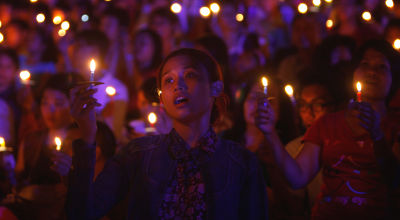Decade After Maluku Massacre, Indonesia Still Dangerous for Christians
More than a decade after the tragic massacre of Christian villagers in Duma in Indonesia’s Maluku Islands, it remains a mystery if anyone was prosecuted for the mass murders and rioting. What’s common knowledge, instead, is that anti-Christian hostility is only escalating in a country which lacks the political will to enforce the values of its own constitution.
On June 19, 2000, the Christian church in Duma—a village in the eastern Moluccan islands—was attacked by thousands of jihadist members of Laskar Jihad, an Islamist, anti-Christian militia that is now believed to be disbanded. More than 200 Christians were killed, 290 were injured and 120 drowned while escaping by boat.
A month before the massacre, the jihadists entered the island to wage a “holy war” against Christians after domestic disputes over local politics, business interests and religious identity. It was the outcome of a time of political instability, following the downfall of former President Suharto.
After surviving a wave of minor attacks, the Christian villagers in Duma began herding together in the Nita church, which had a seven-foot wall around the perimeter. Night after night, they took refuge in the church while men kept watch. The night before the attack, the Christians were tipped off about the imminent attack, but were refused any assistance. One of the village headmen said,”On June 18, we were warned by the army that the village would be attacked the next day. We asked for protection but got none.”
On June 19, the jihadists approached the church, dressed in white robes of war, raising chants about holy war and death. Sensing the seriousness of the attack, some of the village leaders walked out with a white flag, but the surrender was not accepted. The peacemaking party was cut down with a sword and the slaughter began.
Bombs were thrown over the wall to pave the way for a murderous rampage. Women and children fled into the jungle from the back door while the men tried to hold fort at the front door. But the jihadists stormed into the premises and began arbitrarily slaying the Christians.
Sutarsi Selong was confronted by a soldier who ordered her to shout “Allahu Akbar” (“God is great”). When she refused, he put a gun in her mouth and sent a bullet through her cheek. Then he slashed her face with a bayonet. She survived the attack, but remains disfigured.
A 12-year-old boy, Nolede, watched as his parents were hacked with machetes and then buried alive. He managed to escape into the jungles, where he wandered for about a week before running into others who escaped the attack.
Tina, a 16-year-old at the time, says, “I just didn’t want them to take our church. I fell to the ground wounded and was helped by some of the young people. They burned my father alive and cut my brother to pieces with their machetes.”
Over the next two weeks, Christians hid in the jungle and struggled to make their way to the coast, where they escaped in small boats that were part of secret rescue missions organized by people in the neighboring islands. Along with thousands of other victims in the region, the survivors lived as refugees in Manado.
According to media reports, the “ethnic cleansing” campaign between 1997 and 2001, including the attack on Duma, claimed the lives of 30,000 Christians and led to about half a million people being driven out of their homes. Since then, some of the refugees have returned to their homes and have even begun planting crops. While there have also been incidents of Christians attacking and killing Muslims in retaliation, the minority community has generally been at the receiving end.
According to a spokesperson for Barnabas Aid, “Conditions for Christians in the area have since eased considerably, but there have been sporadic episodes of violence. The beheading of three girls as they made their way to their Christian school in Central Sulawesi in 2005 was among the most egregious.” In the last few weeks, two churches in the region were damaged in coordinated attacks, allegedly to incite religious tensions.
More than a decade after the Duma massacre, the future does not look bright for the Christians in Indonesia. According to Setara Institute, an Indonesian human rights watchdog, cases of religious intolerance in the country have been steadily increasing over the past five years. The group recorded 264 incidents of intolerance last year, as compared to 135 cases in 2007.
The massacre at Duma is symptomatic of the weakened political will, military capability, judicial apathy and anti-Christian hostility that created the “extremist” environment in which such an attack could be undertaken without any fear of state reprisals. The nation cannot keep up with the rising incidents of religious intolerance, even more so since it increasingly resembles a nation fearful of extremist groups.
Most Indonesian journalists also believe that President Yudhoyono easily gives in to demands of extremist groups to avoid confrontation and unrest. A BBC correspondent says that many Indonesians believe the military is not only turning a blind eye to the activities of the Muslim militants, but may be arming them as well.
After the fall of President Suharto, “radical decentralization” resulted in a shift of power away from a central government in favor of local administrations. This empowered local leaders to let conflicts simmer and delay, if not entirely dismiss the rule of law, so that Christians fall prey to all manner of religious oppression, ranging from denial of building permits to bombings, threats, killings and forced conversions.
Recent trends suggest that Indonesia appears primed for a rise in extremism that could potentially lead to another Duma, unless its leadership takes on a bold new stand against extremism and fights aggressively for the rights of all its citizens, something that Christians in the country can only hope for at the moment.















































